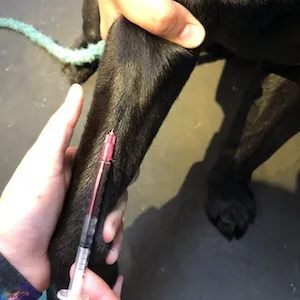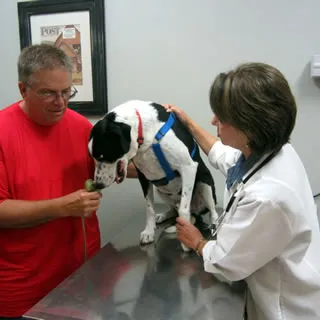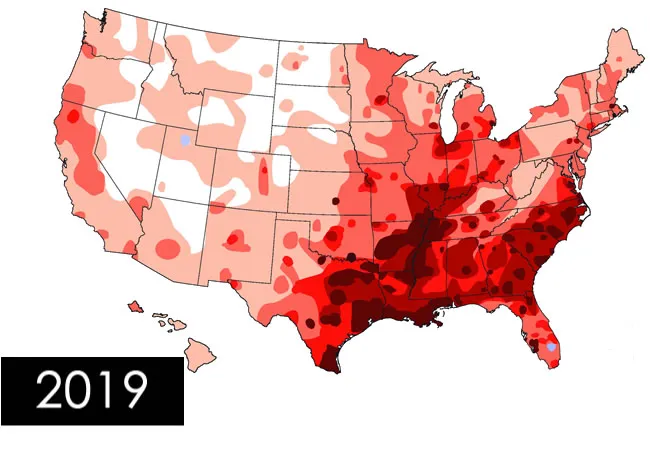Heartworm disease is a severe and potentially fatal condition that can affect dogs, cats, and ferrets worldwide. For dog owners, understanding the symptoms of heartworm in a dog is critical for early detection and successful treatment, protecting their beloved companions from this insidious parasite. While prevention is always the best approach, recognizing the signs can make a life-saving difference if your dog becomes infected. This comprehensive guide will walk you through everything you need to know, from the disease’s basics to the subtle and overt signs of infection, and what steps to take.
What is Heartworm Disease?
Heartworm disease is caused by foot-long worms, known as heartworms, which reside in the heart, lungs, and associated blood vessels of affected animals. These parasites cause significant damage, leading to severe lung disease, heart failure, and harm to other vital organs. Dogs are natural hosts for heartworms, meaning the worms mature into adults, mate, and reproduce within them. Left untreated, the number of worms can escalate into the hundreds, causing lasting damage to the heart, lungs, and arteries, which can profoundly impact a dog’s health and quality of life long after the parasites are gone.
In contrast, heartworm disease in cats is quite different. Cats are atypical hosts, and most worms do not survive to adulthood. Those that do typically number only one to three. However, even immature worms can cause considerable harm, leading to a condition called Heartworm Associated Respiratory Disease (HARD). Crucially, the medication used to treat heartworm infections in dogs is not safe for cats, making prevention the sole protective measure for felines.
 Diagram illustrating heartworms affecting a dog's internal organs.
Diagram illustrating heartworms affecting a dog's internal organs.
The Heartworm Lifecycle: How Infection Occurs
The mosquito plays an indispensable role in the heartworm lifecycle. It acts as an intermediate host, transferring the parasite from an infected animal to a new host. Here’s how the process unfolds:
- Microfilariae Production: Adult female heartworms living in an infected animal (like a dog, fox, coyote, or wolf) produce microscopic baby worms called microfilariae, which circulate in the bloodstream.
- Mosquito Intake: When a mosquito bites and feeds on the blood of an infected animal, it ingests these microfilariae.
- Larval Development: Inside the mosquito, the baby worms develop and mature into “infective stage” larvae over 10 to 14 days, depending on environmental conditions.
- Transmission to New Host: When this infected mosquito bites another dog, cat, or susceptible wild animal, it deposits the infective larvae onto the animal’s skin. The larvae then enter the new host through the mosquito’s bite wound.
- Maturation in Host: Once inside the new host, it takes approximately 6 months for the larvae to mature into adult heartworms.
- Longevity of Worms: Once mature, heartworms can live for 5 to 7 years in dogs and up to 2 or 3 years in cats. This longevity means that each mosquito season can increase the worm burden in an infected pet if prevention is not consistent.
Because mosquitoes can travel significant distances and are present in virtually all climates, the risk of heartworm infection is widespread. Stray animals and wildlife such as coyotes and foxes act as reservoirs for the disease, further contributing to its spread, even into previously uninfected areas. For comprehensive information, you might also be interested in exploring general symptoms of heartworms in dogs and cats.
Recognizing Symptoms of Heartworm in Dogs
Understanding the Symptoms Of Heart Worm In A Dog is paramount for prompt veterinary intervention. In the early stages, heartworm disease is often asymptomatic, making regular testing crucial. However, as the infection progresses and the worms grow, clinical signs become more apparent. The severity of symptoms often correlates with the number of worms present, the duration of the infection, and the dog’s activity level.
Early-Stage Symptoms
Many dog owners may not notice any obvious signs initially, which is why heartworm disease is often called a “silent killer.” However, subtle changes can occur.
- Mild, Persistent Cough: This is often one of the first noticeable signs, especially in more active dogs. The cough might be dry and may worsen after exercise. It occurs as the worms mature and begin to irritate the lungs and pulmonary arteries.
- Reluctance to Exercise: Your dog might become less enthusiastic about walks, playtime, or activities they once enjoyed. They may seem to tire more quickly than usual.
- Fatigue After Moderate Activity: What was once a normal amount of activity now leaves your dog breathless or extremely tired. This is due to the heartworms impeding blood flow to the lungs and heart, reducing oxygen supply to the body.
These early signs can sometimes be mistaken for other less serious conditions, or simply attributed to aging. Therefore, any persistent cough or unexplained decrease in activity warrants a veterinary check-up.
Progressive Symptoms
As heartworm disease advances, the damage to the heart and lungs becomes more pronounced, leading to more severe and noticeable signs and symptoms of heart worm in dogs.
- Decreased Appetite: Dogs with more advanced heartworm disease may show a noticeable reduction in their food intake. This can contribute to weight loss and overall debilitation.
- Weight Loss: Despite a normal or even increased appetite, a dog with heartworms may start to lose weight. This is often a sign that the body is struggling with the parasitic burden and reduced organ function.
- Swollen Belly (Ascites): As heart failure progresses, fluid can accumulate in the abdomen, causing a distended or swollen appearance. This is a serious sign indicating significant heart damage and fluid retention.
- Dull Coat and Poor Body Condition: The general health of the dog deteriorates, which can be reflected in a lackluster coat and an overall unthrifty appearance.
- Abnormal Heart and Lung Sounds: A veterinarian may detect abnormal sounds during a physical examination, indicating problems with heart and lung function.
At this stage, the disease is causing significant systemic damage. Prompt diagnosis and treatment are essential, though the prognosis may be more guarded depending on the extent of organ damage.
Critical Symptoms: Caval Syndrome
In severe cases, particularly when there is a very heavy worm burden, a life-threatening complication known as Caval Syndrome can occur. This is a sudden and acute blockage of blood flow within the heart and major blood vessels.
- Sudden Onset of Labored Breathing: The dog will suddenly struggle to breathe, often with rapid, shallow breaths.
- Pale Gums: The gums will appear unusually pale or even bluish, indicating a severe lack of oxygen.
- Dark, Bloody, or Coffee-Colored Urine: This symptom is caused by the breakdown of red blood cells due to the mechanical obstruction of blood flow by the worms.
- Sudden Collapse: The dog may collapse due to cardiovascular collapse.
Caval syndrome is a medical emergency requiring immediate veterinary attention. Without prompt surgical removal of the heartworm blockage, few dogs survive this critical condition. If you are wondering if a dog has heartworms what are the symptoms that indicate a severe infection, Caval Syndrome is the most critical.
Why Early Detection Matters: The Silent Threat
Given that the early symptoms of heart worm in a dog are often subtle or absent, the disease can progress significantly before a pet owner notices anything amiss. This “silent” progression underscores the importance of consistent heartworm prevention and annual testing. The longer the infection persists, the more extensive the damage to the heart, lungs, and blood vessels, making treatment more complex, costly, and risky. Early detection improves the chances of a successful outcome and minimizes long-term health complications for your dog.
Heartworm Testing: When and Why it’s Crucial
Heartworm disease is a progressive condition. The earlier it is detected, the better the chances of recovery for your pet. Since early signs are often non-existent, a heartworm test administered by a veterinarian is the most reliable method for detecting their presence. The test requires only a small blood sample and works by identifying heartworm proteins (antigens). Results are typically obtained quickly, often within the veterinary hospital. If a test is positive, further diagnostic tests may be recommended to assess the severity of the infection.
Annual Testing Recommendations
The American Heartworm Society (AHS) recommends annual testing for all dogs, even those on year-round prevention. This can usually be performed during your dog’s routine preventive care visit. Annual testing ensures that your prevention program is effective, as no preventive is 100% foolproof. A missed dose, a dog spitting out medication, or even environmental factors can lead to breakthrough infections.
 Veterinarian drawing a blood sample from a dog for heartworm testing.
Veterinarian drawing a blood sample from a dog for heartworm testing.
Testing Puppies and Dogs with Lapsed Prevention
Specific guidelines apply to puppies and adult dogs not consistently on preventive medication:
- Puppies under 7 months: Can start prevention without an initial test, as it takes at least 6 months for a dog to test positive after infection. However, they should be tested 6 months after the initial visit, again 6 months later, and then annually.
- Adult dogs over 7 months previously not on preventive: Must be tested before starting prevention. They also require re-testing 6 months and 12 months later, and annually thereafter.
- Lapse in Prevention: If there has been a lapse (one or more late or missed doses), dogs should be tested immediately, then re-tested 6 months later, and annually thereafter.
Annual testing is a safeguard, catching infections early and allowing for timely treatment, which is critical for your dog’s well-being. Additionally, if your dog has experienced gastrointestinal upset, you might find information on related issues like can worms cause vomiting and diarrhea in dogs helpful.
What to Do If Your Dog Tests Positive
Receiving a positive heartworm diagnosis can be distressing, but the good news is that most infected dogs can be successfully treated. The primary goals are to stabilize your dog’s condition if symptoms are present, then eliminate all adult and immature worms while minimizing treatment side effects.
Here’s what you can expect during the treatment process:
Confirming the Diagnosis
Once an antigen test shows a positive result, your veterinarian will typically recommend a confirmatory test, often a different type, to ensure accuracy. Heartworm treatment is complex and expensive, so a definitive diagnosis is crucial before proceeding.
Importance of Exercise Restriction
As soon as heartworm is confirmed, restricting your dog’s physical activity is vital. Physical exertion increases the rate at which heartworms cause damage to the heart and lungs. The more severe your dog’s symptoms, the more strictly exercise must be limited. This means no running, jumping, or strenuous play—only short, leash-controlled walks for potty breaks.
Stabilizing Your Dog’s Condition
Before the actual heartworm treatment can begin, your dog’s overall health may need to be stabilized. In severe cases or if your dog has other health issues, this preparatory phase could last several months, involving medications to manage symptoms and reduce inflammation.
The Treatment Protocol
Once your veterinarian determines your dog is stable, a multi-step treatment protocol will be administered, often guided by the American Heartworm Society’s recommendations. Dogs with no or mild symptoms (like a cough or exercise intolerance) generally have a high success rate. Those with more severe disease can also be treated successfully, but the risk of complications is higher. It’s important to remember that symptom severity doesn’t always reflect worm burden; dogs with many worms may show few early signs.
 Dog resting comfortably in a veterinary kennel during heartworm treatment.
Dog resting comfortably in a veterinary kennel during heartworm treatment.
Post-Treatment Monitoring and Lifelong Prevention
Approximately 6 months after the completion of treatment, a follow-up heartworm test will be performed to confirm that all heartworms have been eradicated. To prevent re-infection, your dog will need to be on year-round heartworm prevention for the rest of their life. This ongoing prevention is essential to protect them from future mosquito-borne infections.
Understanding Heartworm Prevention
Prevention is the cornerstone of protecting your dog from heartworm disease. It is significantly safer, less costly, and less traumatic than treating an established infection.
How Preventives Work
Whether administered as a monthly pill, a topical spot-on medication, or a long-acting injection, all approved heartworm preventives work by eliminating the immature (larval) stages of the heartworm parasite. This includes the infective larvae transmitted by the mosquito and the subsequent larval stage developing inside the dog. It is crucial to administer preventives strictly on schedule because, in as little as 51 days, immature larvae can molt into an adult stage that cannot be effectively eliminated by preventives.
 Veterinarian examining a dog during a routine check-up, discussing heartworm prevention.
Veterinarian examining a dog during a routine check-up, discussing heartworm prevention.
Starting Prevention Early
Puppies are just as susceptible to heartworm disease as adult dogs. The American Heartworm Society recommends starting puppies on a heartworm preventive as early as the product label allows, ideally no later than 8 weeks of age. Dosage is based on body weight, not age, and puppies grow rapidly. Your veterinarian can advise on anticipating dosage changes during frequent well-puppy exams.
The Importance of a Prescription
Heartworm preventives are prescription medications in the U.S. and require administration under the order of a licensed veterinarian. This is because a veterinarian typically performs a heartworm test before prescribing to ensure your pet doesn’t already have adult heartworms. Administering preventives to an infected dog can lead to rare but severe reactions. Testing is not necessary for very young puppies as it takes approximately 6 months for heartworms to develop to adulthood.
 Veterinarian consulting with a dog owner in an examination room about pet health.
Veterinarian consulting with a dog owner in an examination room about pet health.
Debunking Natural Prevention & Vaccines
Currently, only FDA-tested and proven effective heartworm prevention products should be used. There is no commercially available vaccine for heartworm disease in dogs or cats at this time, though research is ongoing. Prevention relies solely on regular, appropriate use of veterinary-prescribed medications.
Geographic Risk Factors & Year-Round Prevention
Heartworms have been diagnosed in all 50 states, with higher risk in certain regions like the Atlantic and Gulf coasts and along river tributaries. However, “hot spots” can exist anywhere, influenced by climate, mosquito species, breeding areas, and wildlife carriers. Due to unpredictable risk factors and the ability of mosquitoes to survive indoors or be transported, year-round prevention is recommended even in colder climates. Many preventives also offer the added benefit of de-worming for intestinal parasites, which can pose risks to humans.
 Map showing the incidence of heartworm disease across the United States in 2019.
Map showing the incidence of heartworm disease across the United States in 2019.
The Devastating Impact: What Causes Death from Heartworm?
Heartworm disease is highly complex and can affect multiple vital organs, including the heart, lungs, kidneys, and liver. The adult worms trigger inflammation of blood vessels and can cause blockages in blood flow, leading to pulmonary thrombosis (blood clots in the lungs) and eventual heart failure. Given that heartworms can be a foot long, the damage they inflict can be severe and widespread.
Death from heartworm disease can occur due to:
- Heart Failure: The heart struggles to pump blood effectively due to the physical obstruction and inflammation caused by the worms, leading to systemic organ damage.
- Pulmonary Thrombosis: Blood clots form in the lungs, severely impairing oxygen exchange and putting immense strain on the cardiovascular system.
- Organ Failure: Chronic infection can lead to liver or kidney failure as these organs are overwhelmed and damaged.
- Caval Syndrome: A sudden, massive blockage of the major vessels leading to and from the heart, resulting in rapid cardiovascular collapse and death without emergency intervention.
- Massive Larval Exposure: In rare cases, dogs exposed to a large number of infective larvae simultaneously can experience sudden death due to the sheer volume of developing worms overwhelming the vascular system.
Some animals may live with a low worm burden for an extended period, showing minimal or no clinical signs, but their condition can deteriorate rapidly if they face environmental stressors or other significant health problems.
 Heartworms visible within a dog's heart, illustrating the severity of the disease.
Heartworms visible within a dog's heart, illustrating the severity of the disease.
Conclusion
Understanding the symptoms of heartworm in a dog is a crucial aspect of responsible pet ownership. From the subtle, early signs like a mild cough and reluctance to exercise, to more severe indicators like weight loss and a swollen belly, and ultimately the life-threatening Caval Syndrome, awareness can empower you to seek timely veterinary care. However, the often silent progression of this disease emphasizes that prevention and annual testing are the most effective strategies to protect your dog.
Consulting your veterinarian regularly for heartworm testing and consistent preventive medication year-round is the best way to safeguard your dog’s health and quality of life. Don’t wait for symptoms to appear; take proactive steps to ensure your furry friend remains heartworm-free.
References:
- American Heartworm Society. (Accessed various sections on heartworm disease in dogs). While specific URLs for each point from AHS were not provided in the original content, the information aligns with AHS guidelines, indicating it as a primary source.
- U.S. Food and Drug Administration (FDA) labeling guidelines for veterinary pharmaceuticals.
